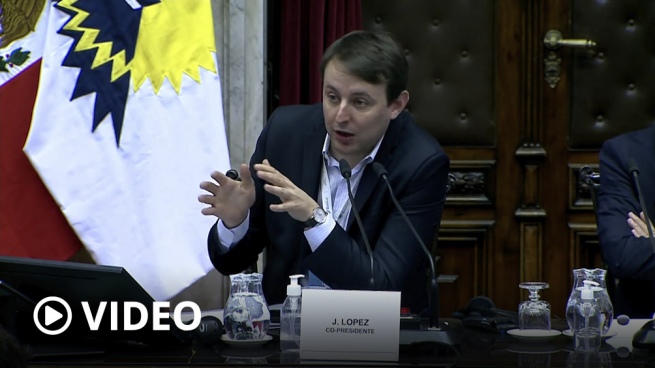The co-chairs of the Euro-Latin American Parliamentary Assembly (EuroLat)which ended its deliberations this Thursday in the city of Buenos Aires, renewed the call for the resumption of the dialogue between Argentina and the United Kingdom on the Malvinas Islands and expressed their “condemnation in the strongest terms” before the “illegal, unprovoked and unjustified military aggression and invasion” committed “by the Russian Federation against Ukraine”.
The final document, of 13 points, is signed by the representative to the Chamber of Congress of the Republic of Colombia and Deputy to the Andean Parliament, Óscar Darío Pérez Pineda, and the deputy to the European Parliament, Javi López, co-presidents of the Assembly.
“In the framework of the XIV EuroLat Assembly held in Buenos Aires, we want to call for a peaceful, just and lasting solution to the sovereignty dispute in relation to the issue of the islands Malvinas”, they expressed in the document.
They pointed out that they make the call “within the framework of the relevant United Nations resolutions, including Resolution 2065 (XX), and registered in the Special Committee on Decolonization of the United Nations General Assembly” and “in accordance with the pronouncements of the EuroLat Assembly of 2013 and 2018”.
They also expressed their “condemnation in the strongest terms of the illegal, unprovoked and unjustified military aggression and invasion committed by the Russian Federation against Ukraine in clear violation of the Charter of the United Nations” and “the outbreak of the largest war conflict in Europe since the Second World War”.
Pérez Pineda and López stressed that the conflict “has generated a humanitarian emergency, with thousands of deaths, injuries and millions of refugees crossing the borders of neighboring EU countries”, without “precedents in contemporary Europe, dramatically increasing uncertainties on the evolution of economies and the prospects for post-pandemic recovery”.
And “in the face of the consequences of the war for world food security and the international prices of food and other basic products,” they asked “intensify efforts to strengthen food supply chains and food security”, including “the protection of production and marketing activities necessary to meet national and global demand and the search for new alternative food suppliers.”
In another of the points they asked the States, organizations and institutions part of the International System to “establish the corridors and the necessary humanitarian aid” to “protect the civilian population in Ukraine”, as well as “contribute to the definitive cessation of the war, also using all diplomatic channels, in the terms established by the Charter of the United Nations”.
Furthermore, they recognized the “significant advances” in vaccination against the coronavirus and the “efforts to advance” in the economic recovery, but they recalled that “it is essential” to strengthen bi-regional cooperation to “jointly face the challenges of the context of international uncertainty” and “the effects of the measures that were adopted to face the pandemic.”
Pérez Pineda and López highlighted the iimportance of strengthening bi-regional cooperation, “especially in the face of fiscal shocks and rising public debt, which limit the ability of many countries to pursue policies that foster an inclusive recovery.”
“The pandemic has exacerbated the problems of poverty and extreme poverty,” they said in the document, noting that for this reason “it is essential to guarantee that the post-pandemic economic and social recovery is comprehensive,” making progress in “creating the conditions for a social transition to ensure that the green and digital transition are fair and inclusive”.
The co-chairs’ document was released after the first plenary session of the Assembly that was held in person after the pandemic and the first in Buenos Aires.
The parliamentarians addressed issues such as hate speech, the situation of Covid-19 and women, the circular economy or food security, the situation in Ukraine and Argentine sovereignty over the Malvinas. EuroLat, which has been meeting annually since 2006, is made up of 75 MEPs and 75 representatives of parliaments from Latin America and the Caribbean.
In this Thursday’s session, in the Chamber of Deputies of the Nation, four resolutions on the invasion of Ukraine were put to the vote, but none of them were approved by the EuroLat system, which consists of voting by component, since a majority of both was needed.
Previously there were video messages from the Catalan Josep Borrell, vice president of the European Commission, and the Maltese Roberta Metsola, president of the European Parliament, who urged to redouble efforts in bi-regional cooperation and called for a “strong message” against the war in Ukraine .
The messages were seen by more than 100 parliamentarians from Europe and Latin America and the Caribbean.
“Although Ukraine is closer to Brussels than to Buenos Aires, this Russian invasion deeply affects us all, defining the world we live in,” said Borrell, the Union’s High Representative for Foreign Affairs and Security Policy. He also called for “promoting a positive agenda in our regions”, with the issues of the 21st century, among which he mentioned social cohesion, the fight against inequality, digital transition, sustainable development, democratic strengthening and citizen security.
For its part, Metsola called for “tackling global challenges together”, among them a fair and inclusive economic recovery, new trade agreements, a post-pandemic recovery, the fight against domestic violence and the improvement of vaccination rates against the coronavirus.
“But more than ever, with war crimes taking place on European soil, I must emphasize the importance that we stand together defending universal values of democracy, rule of law, solidarity, and human rights,” he said in the same vein as Borrell.
For Metsola it is about “an attack against everything we believe in” and also “represents the exact opposite values to those that are the basis of the EuroLat Assembly”.
At the end of the deliberations, the Peronist national deputy Eduardo Valdés, for the local lower house, maintained that “the world needs to dialogue, the regions need to dialogue, but what is broadcast and what is heard is important” and recalled the words of the pope Francis on the conflict.
And Senator Adolfo Rodríguez Saá, head of the Upper House Foreign Relations Committee, highlighted “the urgent need to condemn extortive and abusive financial speculation.”
After the deliberations, the parliamentarians went to the Blue Room of the Senate and to the Lost Steps of Deputies, where they shared a toast and a Concert by the Chamber Orchestra of the National Congress.








